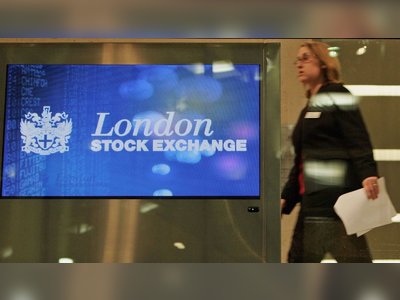
The One Area Where the U.S. COVID-19 Strategy Seems to Be Working
By spending lots of money and not worrying about liability, America is beating Europe in the vaccine race.
The American government’s COVID-19 response has been a disaster, right? The United States strategy is a four-alarm dumpster fire, sent from hell to remind Americans to never again elect a president who describes the scientific method as “Now they have it, they have studied it, they know very much.” When people needed coronavirus guidance, U.S. leaders had none. Government officials told people not to wear masks, oh wait, to definitely wear masks—oh wait, there actually aren’t any masks. Kindergartners went to internet school for a year because America simply refused to get a clue.
In many, many ways, the U.S. pandemic response has been exactly as bad, confusing, and deadly as it has seemed. Vaccination is the exception. On that front, it turns out that America did, in the end, “know very much.” Especially when compared with Europe’s, the U.S.’s vaccination rollout isn’t a tortilla-wrapped turd—it looks almost like a success.
It’s true that Israel, which benefited from its countrywide electronic medical-record system and its decision to buy lots of vaccine doses relative to its population, has the U.S. beat. The United Arab Emirates is also lapping much of the world, immunizing people of all ages using China’s vaccine. The United Kingdom, which authorized the Pfizer-BioNTech shot in December, before any other Western nation, is performing especially well relative to the rest of the globe. The U.K.’s apparent lead over the U.S. is at least in part due to its decision to start mass vaccinations by giving the first dose of the two-dose regimen to as many people as possible, a strategy called “First Doses First.”
But despite lost doses and frustrating vaccine websites, the U.S. is vaccinating its residents faster than any member of the European Union—which may be surprising, given that so many European health-care systems are touted as being more efficient than America’s. As of this writing, the U.S. has vaccinated 15.9 people out of every 100, while Germany has vaccinated just five, France has reached four, and Croatia less than three. The U.S. government, finally, appears to have done something right.
Still, this story is more about the foibles of the European Union than the triumph of the United States. The EU worried that if it left each of its member countries to acquire vaccines for itself, smaller and poorer nations wouldn’t be able to buy enough. European leaders bet that, by negotiating for vaccines as a bloc, they could match America’s purchasing power.
The U.S. pursued vaccine procurement through Operation Warp Speed, a massive new public-private partnership. But the EU opted to handle negotiations through its executive branch, the European Commission. And unfortunately for Europeans, the commission wasn’t very good at its assigned task. It turns out that a deliberative body built for leisurely trade negotiations doesn’t move quickly during a public-health crisis. “The commission has gone from procuring printer paper to procuring this astonishingly large set of vaccines,” says Scott Greer, a health-policy professor at the University of Michigan.
The Trump administration’s Operation Warp Speed didn’t worry about the cost of the vaccines or whether the vaccine companies could be held liable for side effects. The Europeans focused on trying to get a low price for the vaccines, and on making sure the vaccine companies could be sued if the vaccines caused problems. The U.S. threw money at the problem, flooding vaccine makers with billions of dollars in subsidies to increase the speed of vaccine testing and manufacturing. Unlike the EU, the U.S. and the U.K. bought millions of doses of various vaccine candidates last summer, without knowing which ones would be effective. “The U.S. and the U.K. locked in their supplies before they knew the vaccine was going to work,” Lawrence Gostin, a professor of global-health law at Georgetown University, told me. “The EU was more risk-averse.”
The FDA was also faster to approve the vaccines than its European counterpart, the European Medicines Agency, which wanted to be extra sure that the vaccines were safe. The U.K. and the U.S. made deals with vaccine companies much earlier than the EU did, putting the EU weeks, if not months, behind. The EU is “a tanker,” not “a speedboat,” European Commission President Ursula von der Leyen said recently.
Once it finally approved the vaccines, the EU realized that it had bought too few doses. In July, the U.S. ordered 600 million doses of the Pfizer vaccine. The EU put in its order four months later—for half as many doses, The Guardian reported. “More [vaccines] could have been ordered, and faster,” German Health Minister Jens Spahn admitted earlier this month. And when vaccine makers in Europe had manufacturing issues in late January, Europe’s vaccine shortage intensified, causing clinics from Madrid to Paris to Lisbon to cancel vaccination appointments. U.S. vaccine manufacturers, meanwhile, have kept up with demand better than those in China or even Canada, Bloomberg’s Noah Smith points out.
The U.S. has problems with anti-vaccine sentiment. But getting shots into the arms of hesitant Europeans has proved even trickier. For a continent often stereotyped as sophisticated and progressive, Europe has a shockingly high rate of vaccine aversion. Only 36 percent of Western Europeans “strongly agree” that vaccines are safe, compared with 48 percent of North Americans. One in three French people disagree that vaccines are safe, the highest percentage in the world, according to the Wellcome Trust, and a recent poll found that only 40 percent of French people want the COVID-19 vaccine. French women might not get fat, but they also don’t get vaccinated—a major barrier to reaching herd immunity on the Continent.
Although Operation Warp Speed was successful, at least in comparison with Europe’s efforts, part of its victory came down to luck. If the vaccines that the U.S. scooped up so many doses of, by Moderna and Pfizer, had failed clinical trials, “the U.S. would look extraordinarily stupid right now,” Greer says.
And the U.S. has also made plenty of mistakes. Some experts say, for instance, that the FDA should approve the AstraZeneca vaccine, which has already been given the green light by the U.K. and even the cautious EU. Vaccine distribution is still profoundly unequal, with many vaccine hubs being placed in wealthier areas and requiring reliable transportation. Many Black Americans, who have been disproportionately affected by COVID-19, have spent weeks trying and failing to get vaccine appointments for their elderly relatives.
Europe may catch up to the U.S. in vaccinations, once its supply of vaccines starts to flow. The U.K.’s example suggests that it’s wise to distribute the vaccine through the doctors and nurses who generally vaccinate people against the flu and other bugs. “The British, after a record of unremitting incompetence during this pandemic, finally had the good idea of asking the National Health Service to do the vaccines,” Greer says. For COVID-19, a disease in which so much hinges on preexisting risk factors, getting people vaccinated through their regular doctors is smart. “The National Health Service knows you, and it knows your risk,” Greer says.
But the U.S. doesn’t have a National Health Service, and its underfunded public-health departments are already struggling to keep up with lockdowns, contact tracing, and vaccinating. It’s not clear whether the American vaccine story will look as positive after the very old and the very motivated have been vaccinated, and the people remaining are those who don’t have a doctor, don’t trust their doctor, or can’t get to the doctor.
Either way, the debate over which rich country’s vaccination program worked best “is going to be of academic interest [only] by the end of 2021,” Greer says, because people in those countries who want the vaccine will likely have received one by then. In 2022, few will remember whether Estonia or Croatia vaccinated its population faster. The lessons of the U.S. and EU vaccine rollouts may fade into irrelevance—until the next pandemic.
In many, many ways, the U.S. pandemic response has been exactly as bad, confusing, and deadly as it has seemed. Vaccination is the exception. On that front, it turns out that America did, in the end, “know very much.” Especially when compared with Europe’s, the U.S.’s vaccination rollout isn’t a tortilla-wrapped turd—it looks almost like a success.
It’s true that Israel, which benefited from its countrywide electronic medical-record system and its decision to buy lots of vaccine doses relative to its population, has the U.S. beat. The United Arab Emirates is also lapping much of the world, immunizing people of all ages using China’s vaccine. The United Kingdom, which authorized the Pfizer-BioNTech shot in December, before any other Western nation, is performing especially well relative to the rest of the globe. The U.K.’s apparent lead over the U.S. is at least in part due to its decision to start mass vaccinations by giving the first dose of the two-dose regimen to as many people as possible, a strategy called “First Doses First.”
But despite lost doses and frustrating vaccine websites, the U.S. is vaccinating its residents faster than any member of the European Union—which may be surprising, given that so many European health-care systems are touted as being more efficient than America’s. As of this writing, the U.S. has vaccinated 15.9 people out of every 100, while Germany has vaccinated just five, France has reached four, and Croatia less than three. The U.S. government, finally, appears to have done something right.
Still, this story is more about the foibles of the European Union than the triumph of the United States. The EU worried that if it left each of its member countries to acquire vaccines for itself, smaller and poorer nations wouldn’t be able to buy enough. European leaders bet that, by negotiating for vaccines as a bloc, they could match America’s purchasing power.
The U.S. pursued vaccine procurement through Operation Warp Speed, a massive new public-private partnership. But the EU opted to handle negotiations through its executive branch, the European Commission. And unfortunately for Europeans, the commission wasn’t very good at its assigned task. It turns out that a deliberative body built for leisurely trade negotiations doesn’t move quickly during a public-health crisis. “The commission has gone from procuring printer paper to procuring this astonishingly large set of vaccines,” says Scott Greer, a health-policy professor at the University of Michigan.
The Trump administration’s Operation Warp Speed didn’t worry about the cost of the vaccines or whether the vaccine companies could be held liable for side effects. The Europeans focused on trying to get a low price for the vaccines, and on making sure the vaccine companies could be sued if the vaccines caused problems. The U.S. threw money at the problem, flooding vaccine makers with billions of dollars in subsidies to increase the speed of vaccine testing and manufacturing. Unlike the EU, the U.S. and the U.K. bought millions of doses of various vaccine candidates last summer, without knowing which ones would be effective. “The U.S. and the U.K. locked in their supplies before they knew the vaccine was going to work,” Lawrence Gostin, a professor of global-health law at Georgetown University, told me. “The EU was more risk-averse.”
The FDA was also faster to approve the vaccines than its European counterpart, the European Medicines Agency, which wanted to be extra sure that the vaccines were safe. The U.K. and the U.S. made deals with vaccine companies much earlier than the EU did, putting the EU weeks, if not months, behind. The EU is “a tanker,” not “a speedboat,” European Commission President Ursula von der Leyen said recently.
Once it finally approved the vaccines, the EU realized that it had bought too few doses. In July, the U.S. ordered 600 million doses of the Pfizer vaccine. The EU put in its order four months later—for half as many doses, The Guardian reported. “More [vaccines] could have been ordered, and faster,” German Health Minister Jens Spahn admitted earlier this month. And when vaccine makers in Europe had manufacturing issues in late January, Europe’s vaccine shortage intensified, causing clinics from Madrid to Paris to Lisbon to cancel vaccination appointments. U.S. vaccine manufacturers, meanwhile, have kept up with demand better than those in China or even Canada, Bloomberg’s Noah Smith points out.
The U.S. has problems with anti-vaccine sentiment. But getting shots into the arms of hesitant Europeans has proved even trickier. For a continent often stereotyped as sophisticated and progressive, Europe has a shockingly high rate of vaccine aversion. Only 36 percent of Western Europeans “strongly agree” that vaccines are safe, compared with 48 percent of North Americans. One in three French people disagree that vaccines are safe, the highest percentage in the world, according to the Wellcome Trust, and a recent poll found that only 40 percent of French people want the COVID-19 vaccine. French women might not get fat, but they also don’t get vaccinated—a major barrier to reaching herd immunity on the Continent.
Although Operation Warp Speed was successful, at least in comparison with Europe’s efforts, part of its victory came down to luck. If the vaccines that the U.S. scooped up so many doses of, by Moderna and Pfizer, had failed clinical trials, “the U.S. would look extraordinarily stupid right now,” Greer says.
And the U.S. has also made plenty of mistakes. Some experts say, for instance, that the FDA should approve the AstraZeneca vaccine, which has already been given the green light by the U.K. and even the cautious EU. Vaccine distribution is still profoundly unequal, with many vaccine hubs being placed in wealthier areas and requiring reliable transportation. Many Black Americans, who have been disproportionately affected by COVID-19, have spent weeks trying and failing to get vaccine appointments for their elderly relatives.
Europe may catch up to the U.S. in vaccinations, once its supply of vaccines starts to flow. The U.K.’s example suggests that it’s wise to distribute the vaccine through the doctors and nurses who generally vaccinate people against the flu and other bugs. “The British, after a record of unremitting incompetence during this pandemic, finally had the good idea of asking the National Health Service to do the vaccines,” Greer says. For COVID-19, a disease in which so much hinges on preexisting risk factors, getting people vaccinated through their regular doctors is smart. “The National Health Service knows you, and it knows your risk,” Greer says.
But the U.S. doesn’t have a National Health Service, and its underfunded public-health departments are already struggling to keep up with lockdowns, contact tracing, and vaccinating. It’s not clear whether the American vaccine story will look as positive after the very old and the very motivated have been vaccinated, and the people remaining are those who don’t have a doctor, don’t trust their doctor, or can’t get to the doctor.
Either way, the debate over which rich country’s vaccination program worked best “is going to be of academic interest [only] by the end of 2021,” Greer says, because people in those countries who want the vaccine will likely have received one by then. In 2022, few will remember whether Estonia or Croatia vaccinated its population faster. The lessons of the U.S. and EU vaccine rollouts may fade into irrelevance—until the next pandemic.










